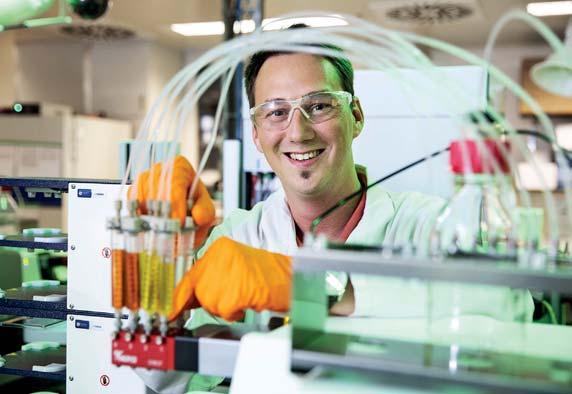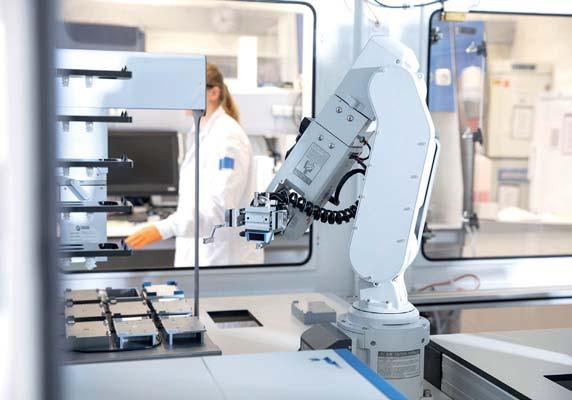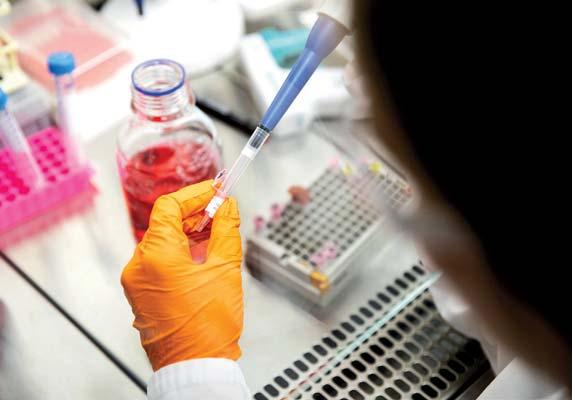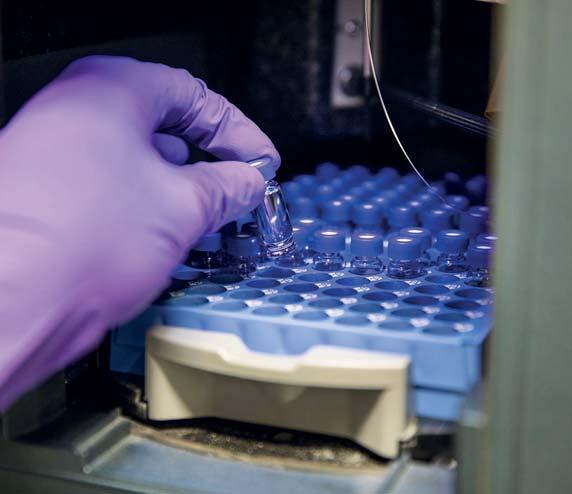
5 minute read
49
by 5rXobdlLrFp
Galapagos Pioneering for patients
Galapagos, headquartered in Mechelen, is active in the research and development of synthetic drugs (“small molecules”) with a new mode of action based on the discovery of new targets. Galapagos focuses on medications that address the cause, not just the symptoms, of diseases with a high medical need. Piet Wigerinck, Chief Scientific Officer at Galapagos, provides an overview of current and future developments.
Advertisement
© Frank van Delft / Galapagos © Frank van Delft / Galapagos

What are Galapagos' main activities currently? We have been active in research and development of small molecules for over 20 years now. In 2020, we intend to take an important next step as a biotech company: the launch of our first own medication. It is a potential treatment option in inflammatory diseases, and it is currently under review for approval with the European Medicines Agency. After more than 20 years in business, this is a very special moment for Galapagos. We are currently active in the following therapeutic areas: inflammatory diseases, fibrosis, metabolic diseases and infectious diseases, and we have potential drug candidates in the pipeline in each of these areas. What is Galapagos' expertise in the discovery and development of small molecule drugs and their new mechanisms of action? Using human primary cells and patient cells, Galapagos discovers the proteins (targets) that play a key role in causing diseases. We then develop small molecules that inhibit these targets, restore the balance and thereby positively influence the course of the disease. In order to do this efficiently and effectively, Galapagos has developed a unique technical platform and is also able to rely on a toolbox with a collection of more than 6,000 genes that code for potential targets. Galapagos is one of the few companies that focuses on discovering new targets. Thanks to our many years of focus, we have developed extensive expertise in this area. Which Phase I clinical trials are you currently carrying out? There are currently several phase 1 research programmes in progress on inflammation and fibrosis. Can you give some examples of ongoing Phase II and Phase III clinical trials? Which diseases are they targeting? Several trials are situated in these phases, including for the potential treatment of Idiopathic Pulmonary Fibrosis (IPF), Crohn's Disease and psoriatic arthritis. In addition, we also have an extensive clinical programme on osteoarthritis walking. Piet Wigerinck, Chief Scientific Officer at Galapagos © Frank van Delft / Galapagos
Key figures for Galapagos
© Frank van Delft / Galapagos
Could you tell us a little more about the three main programmes from target to proof of concept? We have found the targets in a range of different therapeutic areas thanks to our technical platform. For example, we have developed molecules that have gone through the various clinical phases, or that are or will be in the research phase. Hopefully, we will be able to make these potential medications available to all patients in the next few years. After a long time, and providing everything goes according to plan, our first medication will be available to doctors and patients. We are in the final clinical phase with a potential medication for fibrosis and next year we are awaiting data that will allow us to decide whether to go to phase III for our osteoarthritis programme.
© Frank van Delft / Galapagos © Frank van Delft / Galapagos


Do you have any examples of partnerships with the pharmaceutical industry, biotech companies, foundations or universities in the fields of inflammation, osteoarthritis and fibrosis? Galapagos has had several collaborations with pharmaceutical companies in the past, and still has collaborations running with a number of them. Examples include GSK, Servier, Gilead and Abbvie. We have previously combined our own R&D activities with services for pharmaceutical companies. Recently, Galapagos concluded a transformative R&D agreement with American biopharma company Gilead. This means that for at least the next 10 years, Galapagos can continue to set its own course and continue to grow into an integrated international biotech company. In addition, it gives us access to sufficient financial strength to double our R&D organisation and support the further growth of the company. On top of this, we are continuously working with various academic centres to conduct basic research into diseases.
Has Galapagos already established partnerships for the licensing and/or development of new medications? Yes, sure. For our first potential licensed medication, we have a partnership with American company Gilead. Once licensed, Galapagos aims to bring this medicine to patients in Belgium, the Netherlands and Luxembourg. For France, Spain, Germany, the United Kingdom and Italy, an agreement has been made with Gilead for shared market responsibility. Gilead is also responsible for marketing & sales outside Europe.
For all other potential medicines in our pipeline, and for a period of 10 years, Gilead will have the option to inlicense after phase II. If Gilead opts in, Gilead and Galapagos will jointly conduct phase III research. For these programs, Galapagos will be responsible sales & marketing for Europe, and Gilead for the rest of the world, as soon as it receives the necessary approvals. If Gilead does not join, Galapagos may decide to take over the global marketing itself or to set up another partnership.
In terms of therapeutic areas, where are you thinking of entering into future alliances? We are focused on our key areas, inflammation & fibrosis, in collaboration with our partner, Gilead. We also work on additional therapeutic areas, including osteoarthritis. Should Gilead decide not to opt in for any of our future programs, we can evaluate the possibility to close an alliance with other biotech or pharma partners, or alternatively, to bring these independently through clinical research and to patients.

What are your prospects in terms of development? We remain focused on research into potential new medications. In doing so, we will substantially expand the basis for finding new targets. We hope to bring our first medication to patients next year. We also believe that many other medications will follow. We are not afraid to go down completely new roads in our research and development in order to make a genuine difference for patients. It is no coincidence that our motto is “Pioneering for patients. We discover. We dare. We care.”
Galapagos Generaal De Wittelaan L11 A3 - B-2800 Mechelen Tel.: +32 (0)15 34 29 00 - Fax: +32 (0)15 34 29 01 E-mail: communications@glpg.com http://www.glpg.com










